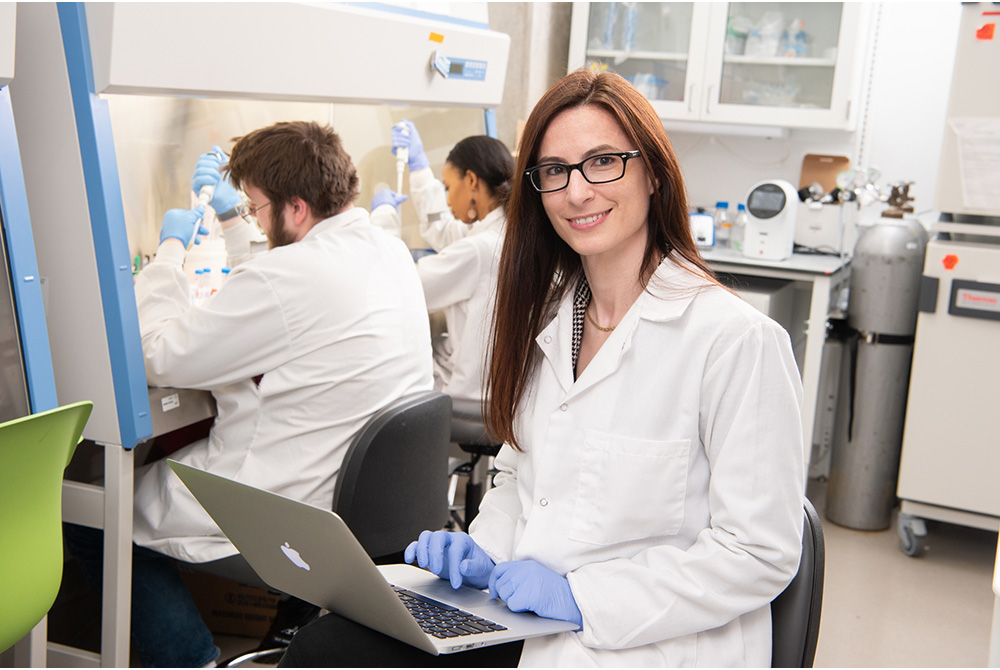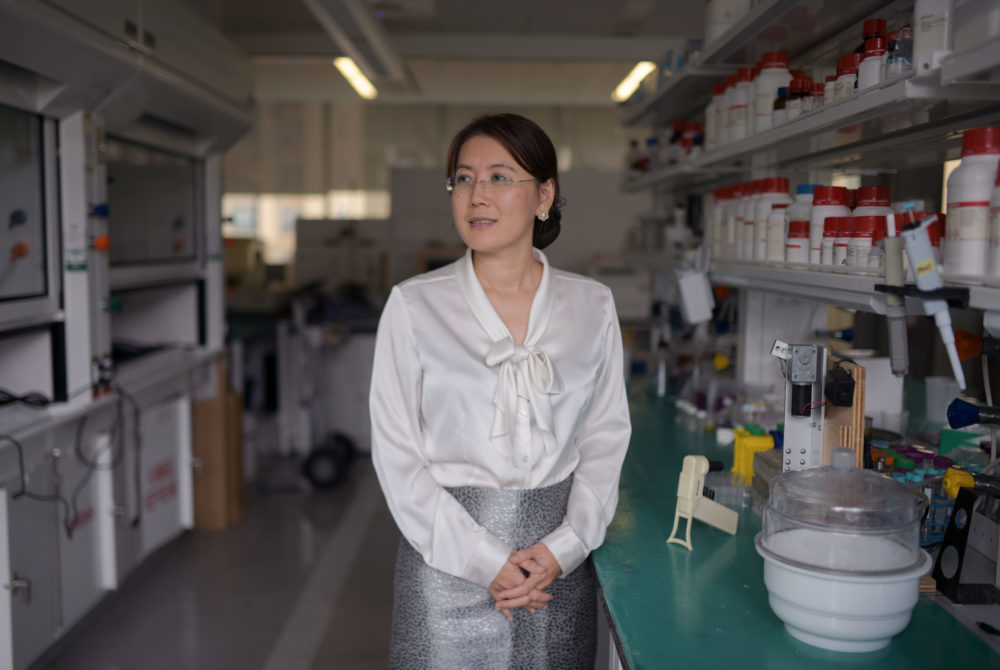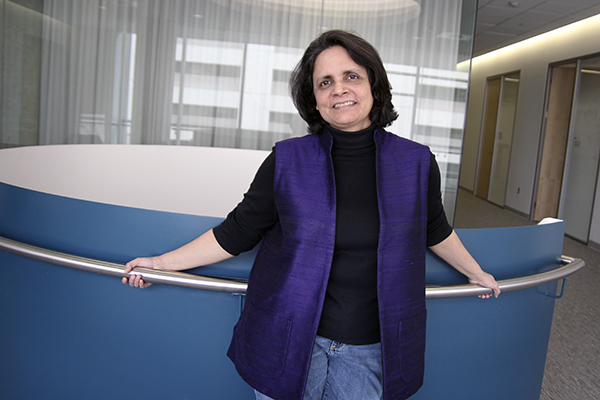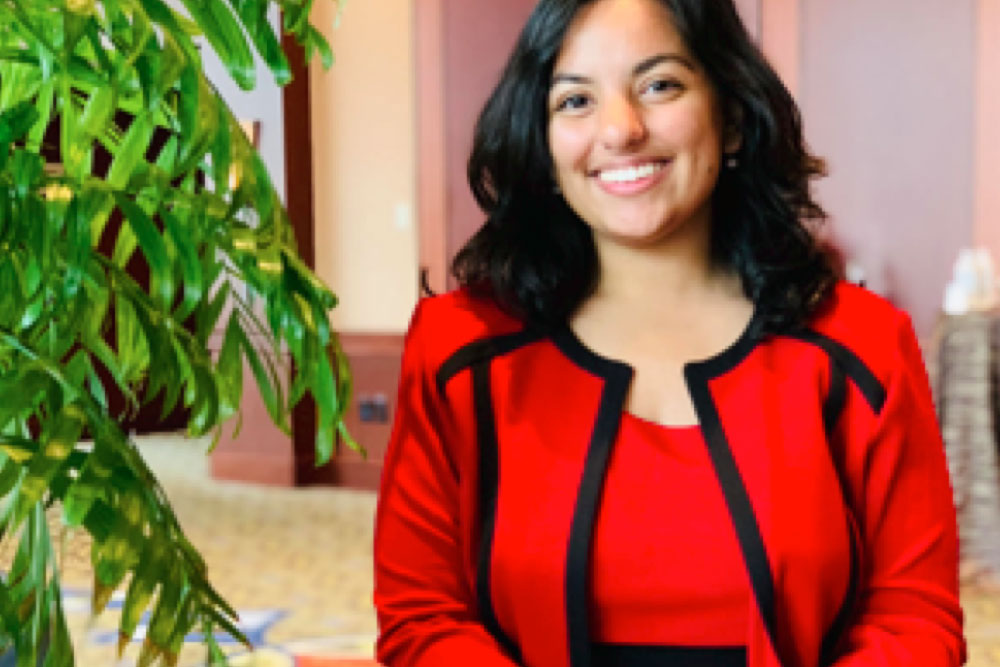Points of Pride
The Women of SEAS are extremely active in research, education and outreach to the community. WiE is proud to highlight these stars in GW SEAS and the engineering profession.

An interview with Prof. Anne-Laure Papa, Biomedical Engineering, GW
In our series of interviews with GW SEAS faculty, WiE Board Member and graduate student Mojolaoluwa Ladipo-Obasa (aka Demi) interviewed Professor Anne-Laure Papa to gain insights on Prof. Papa's background, inspiration, and cancer research.

Lijie Grace Zhang, Associate Dean for Research, SEAS
Lijie Grace Zhang has been appointed Associate Dean for Research in SEAS. Professor Zhang's Bioengineering Laboratory for Nanomedicine and Tissue Engineering applies a range of interdisciplinary technologies and approaches in additive manufacturing, nanotechnology, stem cells, tissue engineering, and drug delivery for various biomedical applications.
The main ongoing research projects include: integrating 3D/4D bioprinting and nanotechnology for complex cardiovascular, neural and musculoskeletal tissue regenerations; investigation of the influence of nano and chemical environments in directing stem cell differentiations for regenerative medicine; developing sustained drug formulations for long term and controlled drug release at disease or cancer sites; and developing novel 3D/4D tunable tissue models for cancer metastasis study and therapeutic discovery.

Dr. Poorvi Vora, Professor of Computer Science, SEAS
Dr. Poorvi Vora and her research group have developed the Athena election audit algorithm and software package, which has been integrated into Arlo, the main election audit software tool used by election officials. The Athena class of ballot polling audits decreases considerably the effort of election officials, and is likely to help make audits more popular among them. No ballot polling audits were performed for the 2020 general election, but pilot (non-binding and post-certification) ballot polling audits for Michigan and Pennsylvania are anticipated in early 2021, when it is hoped that Athena will be used. Dr. Vora’s collaborators are Dr. Filip Zagórski (Wroclaw University of Science and Technology, Poland) and Neal McBurnett (independent software consultant). CS undergraduates Grant McClearn and Sarah Morin participated in all aspects of the work as well, and CS undergraduates Oliver Broadrick, Claire Furtick and Jay Grieve also played a role. The research is/was supported in part by National Science Foundation awards.
Dr. Emilia Entcheva, Professor of Biomedical Engineering, SEAS
Dr. Entcheva studies problems related to electrical activity in the heart, and she is developing a technique to expedite researchers’ ability to observe electrical activity across cardiac cells, including activity that can cause arrhythmias (abnormal heart rhythms), which can be lethal. She has taken a unique approach to it, borrowing an opto-genetic technique that is used more commonly in neuroscience.
Dr. Saniya LeBlanc, Professor of Mechanical Engineering, SEAS
Dr. LeBlanc works to develop technologies that address the growing demand for energy, as well as to improve the energy efficiency of technologies that provide our energy services. In one of her current projects, she is working to understand the link between the technical performance of specific energy materials and systems, and the economic requirements for the technologies to make it out of the lab and into the market.
Dr. Erica Gralla, Professor of Systems Engineering, SEAS
Dr. Gralla studies decision making problems and develops models to reflect the structures and context of various systems in which decisions are made, and to figure out the right decision making approach based on that system. One system she studies is disaster response supply chains.
Clare Boothe Luce Undergraduate Research Scholars publishing their research
The Clare Boothe Luce Program awarded SEAS $300,000 in 2018 to support an undergraduate research program that enables undergraduate female SEAS students to pursue research with guidance from faculty mentors, hone their professional skills, and establish themselves as university leaders. Four sophomore scholars were selected in 2018 and four additional scholars were selected in April 2019. Meet our scholars.
Clark Scholars Program creates opportunities for our undergraduates
The Clark Engineering Scholars Program is the most prestigious undergraduate scholarship program at SEAS, and more than 50 percent of current scholars are women. Through the program, our students participate in undergraduate research and study abroad, work with alumni mentors, have access to networking opportunities, and more.
Shirali Nigam selected to serve on the BMES Education Committee
Biomedical engineering undergraduate Shirali Nigam has been selected to serve a three-year term on the Education Committee of the National Biomedical Engineering Society (BMES). She is the only undergraduate student on the committee of 11 people. The Committee is charged with assessing and providing educational opportunities to enhance professional development, fostering educational best practices, and working with accreditation committees. Shirali also serves as a student member on the internal advisory board for the SEAS Center for Women in Engineering.
Dr. Megan Leftwich conducts unique research with the National Zoo
Dr. Leftwich’s research has been featured in CNN's Great Big Story micro-documentary, “How Sea Lions Are Inspiring the Future of Underwater Transport.” It tells the story of the sea lion research that Dr. Leftwich and her research group are conducting.
Dr. Serena Aunon-Chancellor speaks to students live from the International Space Station
SEAS hosted a live conversation with NASA astronaut and SEAS alumna Dr. Serena Auñón-Chancellor (BS ’97) last September, during her six-month mission aboard the International Space Station (ISS). Sporting her “space hair” and flying the SEAS flag during the 20-minute NASA downlink, Dr. Auñón-Chancellor answered questions about living and working aboard the ISS. Immediately following the downlink, SEAS hosted a follow-on discussion on the challenges of deep space exploration with SEAS alumnus and former astronaut, Dr. Charles Camarda (MS ’80), who was present for the event.
Dr. Zoe Szajnfarber appointed to serve on a National Academies study committee
Dr. Zoe Szajnfarber serves on the National Academies’ Study Committee on the Role of Inducement Prizes in the US Innovation System. “Inducement” prizes are designed to stimulate some activity, such as creating a desired technology or developing products with wide societal benefits. The expert committee will assemble and analyze evidence about the role of inducement prizes in the American innovation process. Dr. Szajnfarber’s term is from January 2019 through September 2020.
Dr. Christyl Johnson, Deputy Center Director for Technology and Research Investments, NASA Goddard Space Flight Center
Dr. Johnson manages the Center’s research and development portfolio and leads an integrated program of investments aligned to meet the Center’s strategic goals. She previously served from 2010 to 2012 as Goddard’s deputy director for science and technology. From 2008 to 2010, she served as executive director of the National Science and Technology Council at the White House Office of Science and Technology Policy. Prior to joining the White House staff, Dr. Johnson served as the assistant associate administrator of NASA. There, along with the associate administrator, she provided oversight of the agency's technical mission areas and field center operations. She earned her PhD in systems engineering from GW.
Dr. Serena Aunon-Chancellor, NASA Astronaut and MD
Dr. Serena Auñón-Chancellor is dually certified in internal medicine and aerospace medicine. She began working with NASA as a flight surgeon in 2006, and in 2009, NASA selected her as one of 14 members of the 20th NASA astronaut class. From June-December 2018, she served as a flight engineer as part of the Expedition 56/57 crew on the International Space Station. Dr. Aunon-Chancellor earned her BS in electrical engineering from GW.













